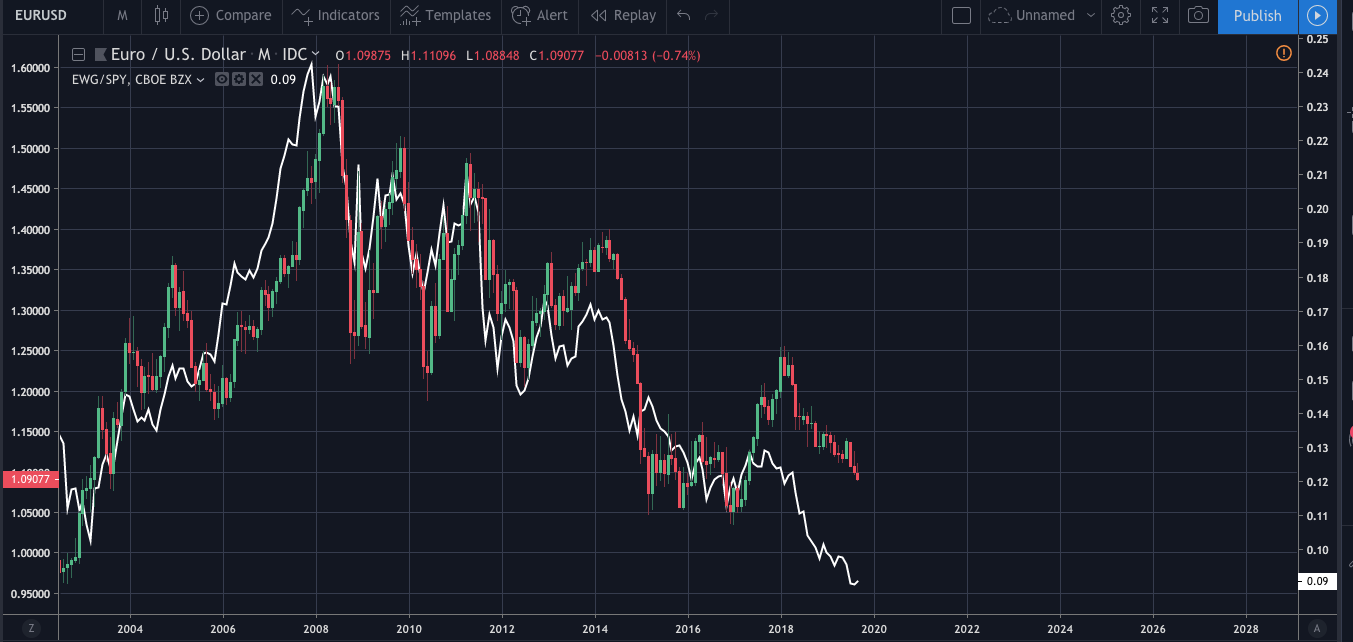The Trade
When elephants fight, it is the grass that suffers, African Proverb
We have been very vocal about trade wars direct impact on FX volatility. The first losers were Latam currencies, namely the Brazilian Real, Colombian and Argentine Pesos as they have all continued tumbled over the past few months.

Latam Currency Index. Source: Macrowise.
Then there was a spike in Chinese Yuan Volatility and Gold.

Gold Vs USDCNH. Source: Tradingview.
The weakness in the carry trade continues
The unwinding of the global carry trade has been key to understanding the outperformance of US investments over those in emerging markets since 2011. The weakness in the carry trade is still prevalent.

Carry trade Index. Source: Bloomberg.

However, the elephant in the room is the Euro...
We believe the big surprise will be the Euro touching parity.

EWG/SPY. Source: Tradingview.
The big picture
A very interesting idea from, Anthony Pompiliano, was presented on CNBC and his website, Off The Chain, recently:
The United States must tokenize the US dollar immediately if it wants to remain globally competitive.https://offthechain.substack.com/
He is convinced that the only rational response to Bitcoin/digital currencies is for the world’s super power to embrace the disruptive technology, rather than try to fight it.
Let’s look at the three main threats to the United States current control of the world’s reserve currency:
Military superiority — If you control the global reserve currency and your superpower status is revoked, you have historically lost global reserve status. No matter how hard nation states try, there are no individuals, companies, or physical locations to attack. No one person or group controls Bitcoin. If a nation state was to capture or kill an individual, nothing would change. If a nation state was to blow up all the mining facilities in their country, nothing would change. Simply, the decentralized nature of Bitcoin renders military superiority irrelevant.
Economic sanctions — The US has done a great job defending its global reserve status by weaponizing the US dollar. Unfortunately for the world’s leading currency, there is no individual, company, or country to sanction in an effort to stop Bitcoin. No one is in control, therefore the economic sanctions are rendered irrelevant.
Cyber warfare — Over the last 10 years, Bitcoin has become the most secure computing network in the world. There are hundreds of billions of dollars in incentives for someone to successfully attack the system, but no one has succeeded yet. Additionally, the network continues to get stronger every day (up 10x in hash rate over the last 2.5 years), which widens the moat of security. Because of Bitcoin’s decentralized nature, cyber warfare tactics are rendered irrelevant.
Connection here with our recent post about stablecoins
Social contracts between nations and their citizens can become complicated when policies such as trade wars and changing political ideologies impact the economy and directly influence the wallets of their citizens. This situation is especially common in emerging markets.
https://macrowise.substack.com/p/stablecoins-and-the-rise-of-a-crypto
It is becoming abundantly clear that these disruptive cryptocurrencies and the digital economy is here to stay. The tipping point is quickly approaching. Will governments stand idly by and watch as their economies struggle and their currencies depreciate further and further? Will central banks continue to step in and attempt to mitigate the situation? How much leverage and time do they have before it is too late? The race is on for a new reserve global currency.
Guillermo Valencia A
Head of Global Macro Research
September 30th, 2019
Floriánopolis, Brazil


